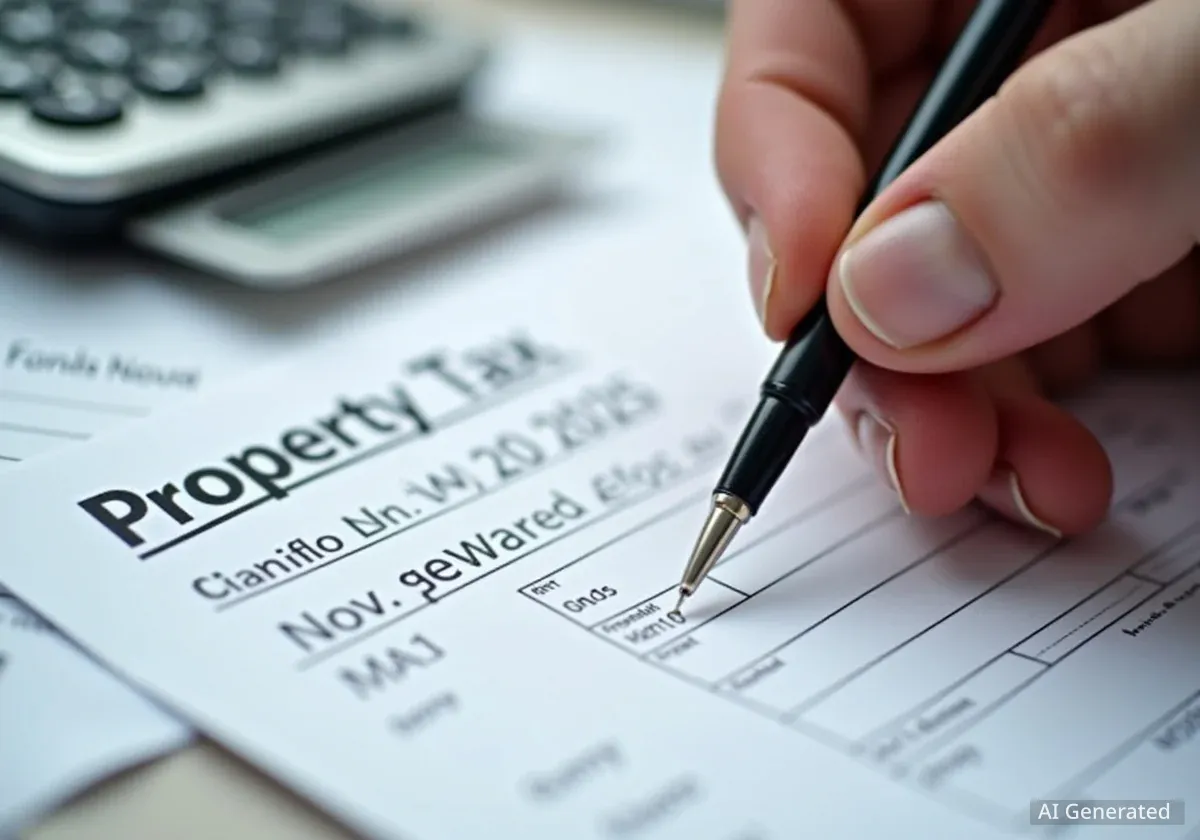Property owners are reminded that the deadline for the second quarter Real Estate and Personal Property tax payments for Fiscal Year 2026 is approaching. All payments must be submitted or postmarked by Monday, November 3, 2025, to avoid penalties.
These timely payments are essential for funding a wide range of local government services that residents rely on daily. The Tax Collector's office has provided guidance for property owners to ensure a smooth payment process ahead of the deadline.
Key Takeaways
- Payment Deadline: Monday, November 3, 2025, for FY 2026 second quarter taxes.
- Applicable Taxes: The deadline applies to both Real Estate and Personal Property tax bills.
- Importance: Tax revenue is critical for funding essential municipal services such as schools, public safety, and infrastructure maintenance.
- Contact Information: For questions, property owners can reach the Tax Collector's office at 508-979-4023, extension 9104.
Details of the Upcoming Tax Deadline
The upcoming payment deadline specifically covers the second quarter of Fiscal Year 2026. Property owners should have received their tax bills in the mail, detailing the amount owed for this period. It is the responsibility of the property owner to ensure payment is made on time, even if a bill was not received.
This deadline applies to two primary types of property taxes. Real Estate tax is levied on land and any structures on it, such as homes and commercial buildings. Personal Property tax typically applies to movable assets owned by businesses, including equipment, machinery, and furniture.
Officials recommend that residents do not wait until the last minute to make their payments. Submitting early can help avoid potential processing delays, especially for those paying by mail.
Understanding the Fiscal Year
A fiscal year is a one-year period that governments and companies use for financial reporting and budgeting. Unlike a calendar year, which runs from January 1 to December 31, a government's fiscal year often starts on a different date. For many municipalities, the fiscal year begins on July 1 and ends on June 30 of the following year. Therefore, Fiscal Year 2026 began on July 1, 2025, and will end on June 30, 2026.
The term "FY 2026" refers to this specific 12-month accounting cycle. Tax bills are typically divided into quarterly payments throughout this period to help manage cash flow for both the municipality and the taxpayer.
How Property Tax Revenue Supports the Community
Property taxes are the primary source of revenue for most local governments across the United States. The funds collected from these payments are not just an administrative requirement; they are the financial backbone of the community. Without this revenue, essential public services would be severely underfunded or unavailable.
The money collected is allocated to a variety of critical departments and functions. These often include:
- Public Education: Funding for local schools, including teacher salaries, classroom supplies, and building maintenance.
- Public Safety: Budgets for police departments, fire departments, and emergency medical services (EMS).
- Infrastructure: Maintenance and repair of roads, bridges, sidewalks, and public water and sewer systems.
- Community Services: Support for public libraries, parks, recreational programs, and senior services.
Timely payment by all property owners ensures that these services can operate without interruption and that the local government can meet its budgetary obligations for the fiscal year.
According to the Lincoln Institute of Land Policy, property taxes accounted for nearly 32% of all state and local tax collections in the United States in a recent fiscal year, highlighting their critical role in funding local government operations.
Available Payment Methods and Procedures
To accommodate property owners, the Tax Collector's office typically offers several methods for submitting payments. While specific options can vary, the most common methods include paying online, by mail, or in person.
Online Payments
Many municipalities now offer a secure online portal for tax payments. This is often the most convenient option, allowing residents to pay via electronic check (ACH transfer) or credit/debit card. Property owners should be aware that using a credit or debit card may incur a small processing fee from a third-party vendor.
Payment by Mail
For those who prefer a traditional method, payments can be mailed to the Tax Collector's office. It is crucial to include the payment coupon from the tax bill and write the parcel or account number on the check. To be considered on time, the payment must be postmarked by the U.S. Postal Service on or before the November 3, 2025, deadline.
"We strongly encourage residents paying by mail to send their payment several days in advance to ensure it receives a timely postmark," advises a municipal finance guide. "Relying on a last-day postmark can be risky if there are any postal service delays."
In-Person Payments
Payments are also generally accepted in person at the Tax Collector's office during regular business hours. This method is ideal for those who wish to receive an immediate, stamped receipt as proof of payment. It is advisable to check the office's hours of operation before visiting.
For any questions regarding payment methods or account balances, property owners are encouraged to call the Tax Collector's office directly at 508-979-4023, Ext. 9104.
The Consequences of Missing the Deadline
Failing to pay property taxes by the established deadline can lead to significant financial penalties. State and local laws dictate the specific consequences, but they generally involve the assessment of interest and other fees on the overdue amount.
Interest begins to accrue immediately on the day after the due date. The rate can be substantial, making it costly to delay payment. These charges are legally mandated and cannot be waived by the collector's office.
If a tax bill remains unpaid for an extended period, the municipality can place a tax lien on the property. A lien is a legal claim against the property for the amount of the unpaid taxes, plus all accrued interest and penalties. This lien takes priority over most other claims on the property, including mortgages. Ultimately, an unresolved tax lien can lead to foreclosure proceedings, a process known as a tax taking or tax sale.
Property owners who anticipate difficulty in making their payment by the deadline should contact the Tax Collector's office as soon as possible. While payment plans are not always available, discussing the situation proactively is the best course of action to understand any potential options and avoid more severe consequences.





